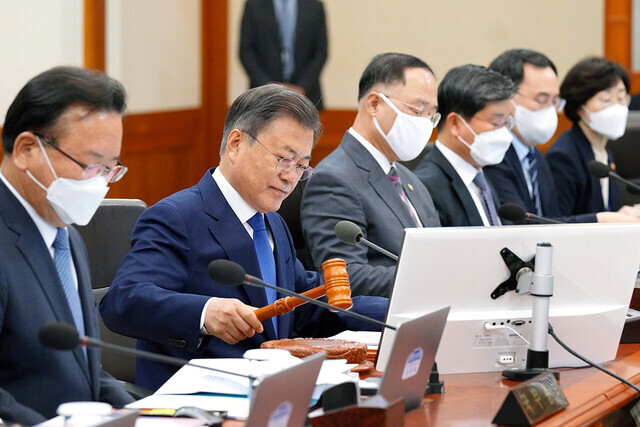hankyoreh
Links to other country sites 다른 나라 사이트 링크
Moon says prosecution reform meets demands of history and today

South Korean President Moon Jae-in referred to the amendments to the Prosecutors’ Office Act and Criminal Procedure Act to separate the prosecutors’ investigation and indictment powers as a “policy direction that accords with the demands of history and the times.”
He also stressed the need for “swift and constructive discussions by a bipartisan special judicial reform committee to ensure that the intent of these reforms is suitably reflected in the legislation review process, including the establishment of an agency for the investigation of serious crimes.”
Moon’s remarks about the proclamation of partial amendments of the two acts were delivered at a Cabinet meeting at the Blue House on Tuesday, the Blue House reported.
In conducting a review of the legislation, Moon said the amendments would reduce the categories of crimes where prosecutors are able to initiate their own investigations to two types — crimes involving corruption and economic crimes — and prevent cases of human rights violations through excessive “targeted investigations” by prosecutors.
He also noted that the amendments preserved prosecutors’ authority to conduct supplementary investigations and provisionally kept in place their powers to conduct investigations in connection with the upcoming local elections in June — which he said would contribute to allaying potential concerns about the legislation.
Moon went on to say that he viewed the “adjustment of the prosecutors’ and police’s investigation powers and prosecutorial reforms” as a “policy direction that accords with the demands of history and the times.”
He further called for “the establishment of an institutional foundation by the relevant agencies, including lower-level laws, as well as swift and constructive discussions by a bipartisan special judicial reform committee to ensure that the intent of these reforms is suitably reflected in the legislation review process, including the establishment of an agency for the investigation of serious crimes.”
He went on to ask for “the utmost efforts to achieve important historical progress in establishing the right image for the prosecutors that meets the public’s demands, and in restoring the public’s trust in criminal and judicial procedures.”
His remarks were read as a call to the Ministry of Justice and the prosecution service not to buck the reforms pursued by the Moon administration as his successor, President-elect Yoon Suk-yeol, prepares to take office.
Moon also asked the attendees to “bear in mind that however the system may change, improving the police’s investigation capabilities and ensuring organic cooperation between prosecutors and police on investigations is absolutely essential for boosting the quality of national investigations and protecting the public.”
During the Cabinet meeting that day, Seoul Mayor Oh Se-hoon voiced objections to the legislation’s proclamation.
“Seoul Mayor Oh Se-hoon expressed concerns about investigation delays, weakened investigation capabilities, issues with protecting the socially vulnerable, and procedural fairness,” reported Blue House spokesperson Park Kyung-mee.
In a post to his Facebook page, Oh wrote that he had called on Moon during the Cabinet meeting to “perform your final duty as president by exercising your power to veto the amendments to the Prosecutors’ Office Act and Criminal Procedure Act.”
In response, Minister of Justice Park Beom-kye defended the approval of the amendments.
“The amendments that were passed were reduced in scale from the ones agreed upon by the two parties and ratified at a general meeting of National Assembly members, and their approval is appropriate from a standpoint of respect for parliamentarism,” he said.
Joining the defense of the amendments was Minister of the Interior and Safety Jeon Hae-cheol, who noted that there had been “considerable damages that have resulted from direct investigations and targeted investigations by prosecutors.”
By Lee Wan, staff reporter
Please direct questions or comments to [english@hani.co.kr]

Editorial・opinion
![[Guest essay] Preventing Korean Peninsula from becoming front line of new cold war [Guest essay] Preventing Korean Peninsula from becoming front line of new cold war](https://flexible.img.hani.co.kr/flexible/normal/500/300/imgdb/original/2024/0507/7217150679227807.jpg) [Guest essay] Preventing Korean Peninsula from becoming front line of new cold war
[Guest essay] Preventing Korean Peninsula from becoming front line of new cold war![[Column] The state is back — but is it in business? [Column] The state is back — but is it in business?](https://flexible.img.hani.co.kr/flexible/normal/500/300/imgdb/original/2024/0506/8217149564092725.jpg) [Column] The state is back — but is it in business?
[Column] The state is back — but is it in business?- [Column] Life on our Trisolaris
- [Editorial] Penalties for airing allegations against Korea’s first lady endanger free press
- [Editorial] Yoon must halt procurement of SM-3 interceptor missiles
- [Guest essay] Maybe Korea’s rapid population decline is an opportunity, not a crisis
- [Column] Can Yoon steer diplomacy with Russia, China back on track?
- [Column] Season 2 of special prosecutor probe may be coming to Korea soon
- [Column] Park Geun-hye déjà vu in Yoon Suk-yeol
- [Editorial] New weight of N. Korea’s nuclear threats makes dialogue all the more urgent
Most viewed articles
- 1[Column] Why Korea’s hard right is fated to lose
- 2[Guest essay] Preventing Korean Peninsula from becoming front line of new cold war
- 3Yoon’s broken-compass diplomacy is steering Korea into serving US, Japanese interests
- 4S. Korean first lady likely to face questioning by prosecutors over Dior handbag scandal
- 5Amid US-China clash, Korea must remember its failures in the 19th century, advises scholar
- 6After 2 years in office, Yoon’s promises of fairness, common sense ring hollow
- 7Lee Jung-jae of “Squid Game” named on A100 list of most influential Asian Pacific leaders
- 8[Column] The state is back — but is it in business?
- 9[Column] Life on our Trisolaris
- 10Hybe-Ador dispute shines light on pervasive issues behind K-pop’s tidy facade